5G
Latest

Apple granted approval to test its 5G wireless technology
The FCC has approved an application for Apple to begin testing its 5G technology, which means the company is joining a number of others already working towards bringing 5G to the masses. Sprint is looking to launch its 5G service in 2019, while T-Mobile is shooting for 2020. AT&T and Verizon are making moves towards 5G networks as well.

ESA throws its weight behind satellite-based 5G internet
The European Space Agency has joined forces with 16 European space companies to demonstrate and champion satellite-based 5G internet. They're calling their new initiative "Satellite for 5G," and they signed their agreement at the Paris Air and Space Show. The partners aim to deploy satellites for use in various trials to be performed over the next few years. By doing so, they hope to convince providers that satellite-based 5G can be better than terrestrial-based ones in many situations and to secure support from the European Commission. As Magali Vassiere, ESA's Director of Telecommunications, said in an interview embedded after the break, satellites can provide high-speed 5G connection even on mountains and islands far from cell towers. They could also ensure that you can reach first responders wherever you are on Earth.

Intel puts VR to work for more immersive coverage of the Olympics
Intel is teaming up with the International Olympic Committee on "future experiences" for the Olympics, the chip maker announced today at an event in New York City. The new partnership, which will run through the 2024 games, is set to focus on tech like virtual reality, 5G connectivity and drones. According to Intel CEO Brian Krzanich, the idea is to use these technologies to help athletes, coaches and, of course, fans, including those who will be watching the summer or winter Olympics from home. For example, Krzanich says that Intel is going to set up a 5G network at the 2018 games, while its True VR platform will let fans watch events in 360-degree video.
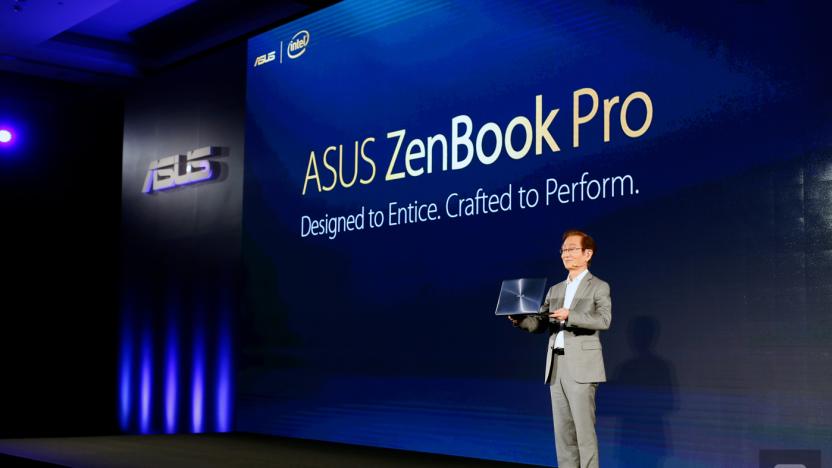
Computex was a reminder that the age of the eSIM is upon us
Nestled inside your cellphone is a teensy sliver of plastic you almost certainly never think about. That's your SIM card -- the bit that basically stores your phone's identity and passes it along to whatever wireless carrier network you pay for. It's absolutely crucial to the way your phone operates, but wireless carriers and network companies have been plotting its demise for years. As far as they're all concerned, the future belongs to what's called an eSIM -- short for "embedded SIM" -- woven directly into the silicon fabric of a device's modem. Now, thanks to some crucial announcements made at Computex, we're getting a better sense of just how pervasive these things are going to be.
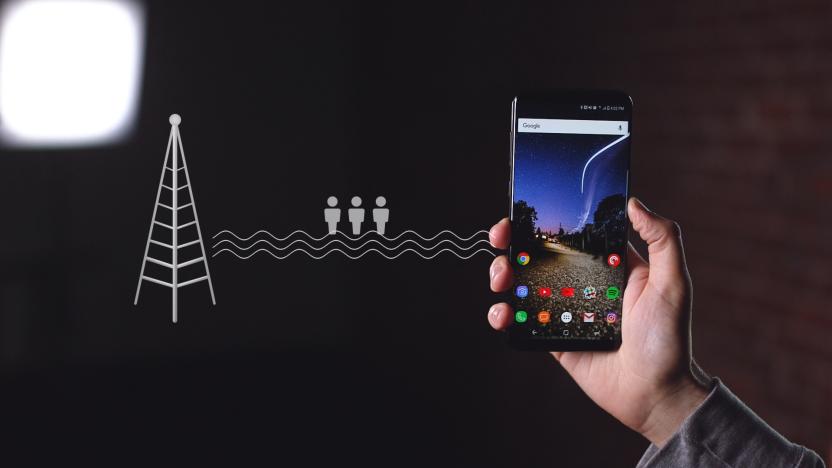
What is mobile gigabit, and why should you care?
You may have heard about this thing called a gigabit phone recently. The term was thrown around a lot during the launch of Samsung's Galaxy S8, since that's the first commercially available handset to support the technology. But gigabit will also be included on Sony's Xperia XZ Premium and other high-end phones, which means you'll probably hear about it a lot more later this year. And it's going to be a big deal.

Verizon outbids AT&T for key 5G wireless spectrum (updated)
A month ago, AT&T announced it would acquire Straight Path Communications for $1.6 billion, specifically because Straight Path owns licenses to use high-frequency radio waves that will be crucial for the next generation of wireless technology. However, after that agreement, an unnamed Multi-National Telecommunications Company (that is reportedly Verizon, the owner of this website) stepped up with a bid of $3.1 billion in stock, and tonight the Wall Street Journal reports that AT&T has declined to match it.
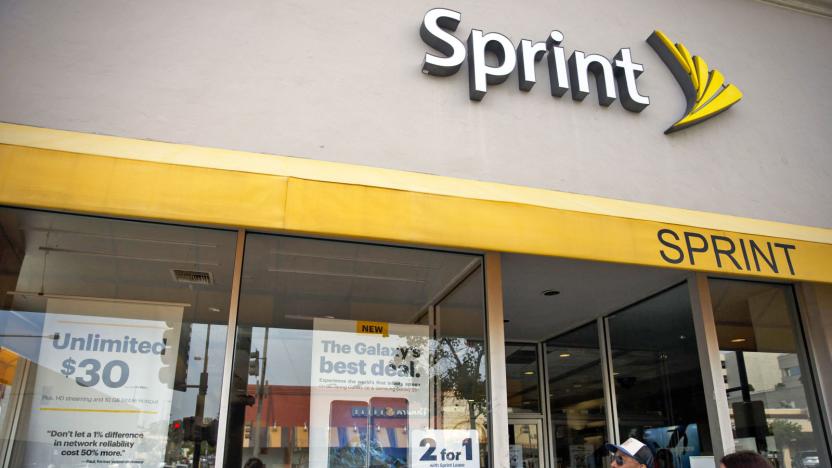
Sprint will launch its 5G network in late 2019
Sprint isn't going to sit by the wayside while AT&T, T-Mobile and Verizon make a fuss over their 5G wireless plans. The carrier has revealed that it's working with its parent company SoftBank and Qualcomm to launch its 5G network in late 2019. Details are scant at this point (it's over 2 years away, after all), but Sprint expects to use its existing 2.5GHz airwaves for the ultra-fast cellular link.

T-Mobile plans to launch a national 5G network by 2020
T-Mobile isn't going to sit by the wayside while its carrier rivals talk up plans for 5G networks. The magenta crew has announced that it plans to roll out a nationwide 5G network starting in 2019, with completion by 2020. It'll use some of the provider's 600MHz frequencies to help make this speedy service happen. And yes, this will be real, standards-based 5G -- not the faux 5G (really an amalgam of upgrades to 4G) AT&T launched in April. The news is bound to make you happy if you're eager for a wireless internet connection faster than your landline service at home, although it's important to be cautious. Like most hyped-up network upgrade, there's some context you're not getting.

AT&T's faux 5G network launches in Austin
At last, 5G wireless is here... sort of, but not really. As promised, AT&T has launched its unofficial 5G network, starting with certain parts of Austin. So long as you have a Galaxy S8 or S8 Plus, you can get speeds that should leave regular LTE in the dust. Expect downloads about twice as fast on average, the carrier says. Indianapolis is due for the next rollout in the summer, and there will be 20 total areas covered (including Atlanta, Boston, Chicago, Los Angeles, Nashville and San Francisco) by the end of 2017. And if you're not inclined to Samsung hardware, you should see "numerous other devices" this year that take advantage of the new network.

Smart bandages will use 5G data to track your health
Bandages are usually very mysterious -- it's hard to know how well you're healing until you unwrap them, and that usually means a trip to the doctor. If Welsh researchers succeed, however, you'll never have to wonder what's going on underneath all that cloth. Swansea University is planning trials (due within 12 months) of smart, 3D-printed bandages that will use 5G wireless data and nano-sized sensors to constantly relay details about your health. It would help physicians customize treatment based on the progress of your wound, your location and your activity. If you're healing well and are staying active, for example, you may get a different solution than someone who's recovering slowly and needs to stay home.
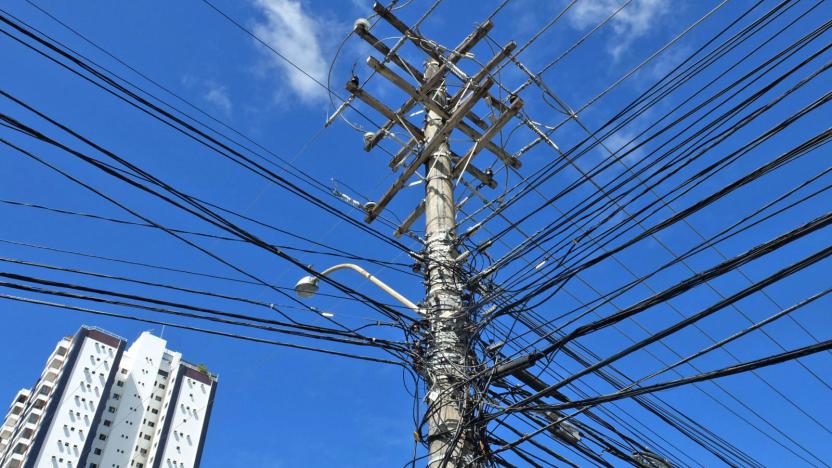
AT&T paid $1.6 billion to own the next generation of wireless
For all intents and purposes, it looks like AT&T is going to own a majority of 5G wireless connections in the US. The company has announced that it has acquired Straight Path Communications for $1.6 billion. Not familiar with the name? That's totally understandable. "Straight Path is the largest commercial holder of the 39 GHz spectrum, with about 95 percent of the total licenses commercially available, as well as a significant holder of 28 GHz in major markets, including New York and San Francisco," the company's website reads.

What the Spring 2017 Budget means for UK tech
The UK's chancellor Philip Hammond has provided more details today on the National Productivity Investment Fund (NPIF), a project unveiled at last November's Autumn Statement to support science and technology. The headline announcement is the Industrial Strategy Challenge Fund (ISCF), which falls under the NPIF and will be used to support electric vehicles, artificial intelligence and robotics. An "initial investment" of £270 million will be spent in 2017/18 to support what is being called "disruptive technologies." These include "the development, design and manufacture of batteries that will power the next generation of electric vehicles."

K-pop and VR at MWC is sensory overload
I expected MWC to be a roller-coaster ride of emotions, but I wasn't quite anticipating getting on a literal one (albeit in VR) here at the show. When Korea Telecom (KT) offered up a chance to party with K-pop band Twice, I just had to get in line despite not really knowing what awaited me. VR experiences are pretty played out at this point, but Korea Telecom adds a twist by promising to deliver the media over 5G, which it just announced it will deploy commercially by 2019. Of course, since 5G isn't actually a thing yet, we were wired into a computer, and this demo really only showcased KT's ability to create entertaining VR content with a simulator ride.

Draft 5G specs lay the groundwork for a real standard
With all the hype around early 5G launches and tests, there's one glaring problem: the telecom industry hasn't really defined what 5G is. However, the super-fast wireless is starting to take shape. The International Telecommunication Union has published draft 5G specs that set performance expectations. As a user, you should get 100Mbps download speeds and 50Mbps for uploads -- unlike with LTE, though, that's more of a consistent baseline than a theoretical maximum. You should also see extremely low lag of no more than 4ms (versus 20ms for LTE), and service should work on trains traveling as quickly as 500km/h (311MPH). In short, this should be as fast as a good home internet connection.
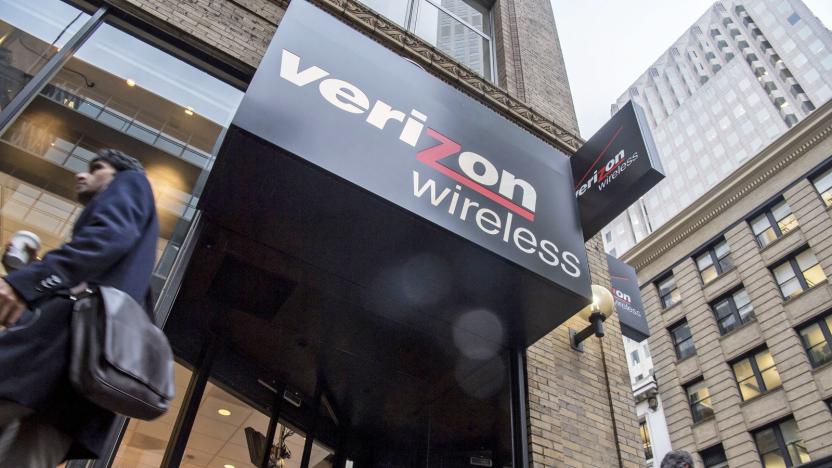
Verizon will test 5G wireless in 11 cities by mid-2017
Verizon isn't going to let AT&T's 5G plans go unanswered. The carrier (and our corporate overlord) says it will pilot the gigabit-class wireless in 11 cities by the middle of 2017, including major urban hubs like Atlanta, Dallas, Denver, Houston, Miami, Seattle and Washington, DC. These will be "pre-commercial services" offered to specific customers, so don't expect to try extra-fast cellular data in your neighborhood. Instead, this is about investigating "scenarios and use cases" before Verizon is ready to ask for money.

Intel and Ericsson form an alliance to explore 5G applications
Intel is already showing off the building blocks of its 5G hardware at MWC and the big carriers are rushing to upgrade to the new standard, but the chipmaking giant is also launching a new initiative to build more than just faster cellular network. According to an announcement today, Intel and it's launch partners from Ericsson, Honeywell, General Electric and the University of California Berkeley have formed the 5G Innovators Initiative to explore and test new ideas that could change how connected devices, business, cities, and media operate. At launch, the 5GI2 will focus on the Industrial Internet of Things, including AR and VR applications for drones and first responders. The initiative will eventually expand to other industries as more groups join up, but 5GI2 hopes to build and test applications for autonomous vehicles, smart infrastructure, health care and media, among others. The pilot programs will include full "step-by-step blueprints" of the speed, security and connectivity requirements so they can be easily replicated or open-sourced. "5G is not simply about making smart phones faster," Intel VP and General Manager of Next Generation Standards Asha Keddy said in a statement. "It's about the machines and things that will deliver an entirely new smart and connected future. Building our 5G future requires a new approach to industry collaboration and development."
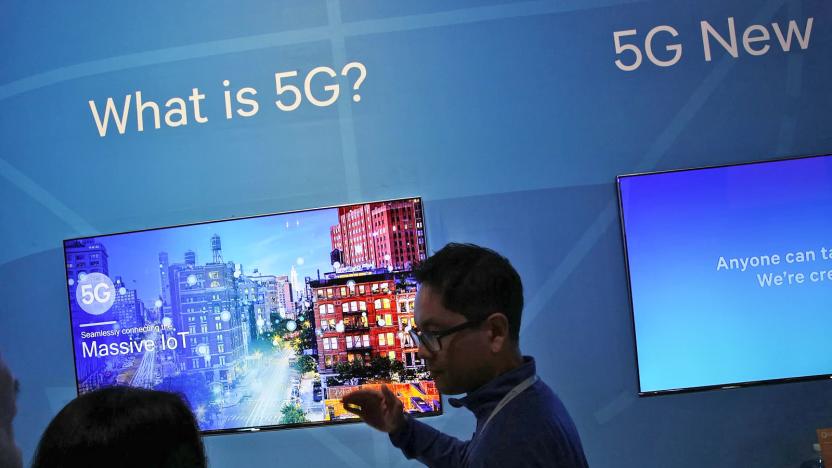
Intel and Qualcomm are steadily gearing up for 5G
We're still years away from a finalized 5G standard, and it'll be even longer before we get compatible devices in our hands, but we're seeing plenty of companies readying themselves for speedier networks. In particular, Qualcomm and Intel are hoping to play essential roles in the 5G ecosystem, which is poised to be at least ten times faster than existing networks and offer features like near-instant latency. While 5G started to seem more real at last year's show, now the companies are focused on refining their new hardware to be ready for the rollout of new networks in a few years.

AT&T will launch 5G wireless in two cities this year
AT&T's 5G wireless network just got much more tangible. The carrier has announced that its ultra-fast wireless will launch in two cities, Austin and Indianapolis, sometime later in 2017. And while it's still early days, the company is confident enough to set some performance expectations. Initially, these 5G areas will deliver peak speeds of 400Mbps or better. And there's definite room for it to grow -- carrier aggregation and other techniques should push that to 1Gbps in "some areas" this year.
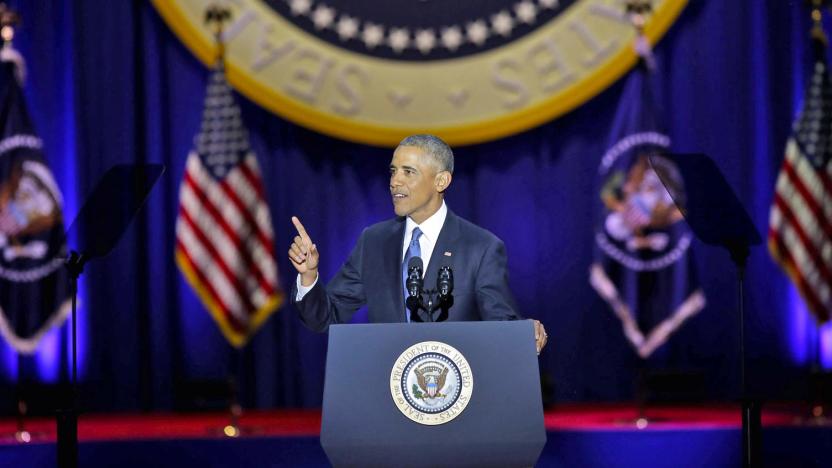
Obama's legacy: The most tech-savvy president
When Barack Obama moved into the White House on January 20th, 2009, the federal government was in the digital dark ages. Even as late as 2011, he was complaining that the White House was 30 years behind. Among other things, Obama was the first president to carry a BlackBerry, and even so, it wasn't until 2016 that the leader of the free world was finally able to trade in his aging RIM device for a modern smartphone. And, as the president was quick to point out in an interview with Jimmy Fallon, the unnamed phone is so locked down, it's like one of those "play phones" you'd give to a 3-year-old. Despite these hurdles, Obama made it one of his priorities to modernize the federal government on everything from telecommunications policy to White House IT. He tackled infrastructure, STEM education, net neutrality and climate change in serious and substantive ways. Of course, the president's efforts weren't always a rousing success, and on issues involving privacy, spying and drone usage, he faces lingering criticism from both ends of the political spectrum. But, love him or hate him, for better or worse, when it comes to science and technology, Barack Obama has had a bigger impact than almost any president in history.

AT&T to conduct 5G streaming tests with DirecTV Now
In a simultaneous test of wireless broadband and net neutrality, AT&T will test its upcoming 5G tech with DirecTV Now video streaming. Trial customers in Austin, Texas will be able to stream the services on a variety of devices over fixed 5G connections at several sites. The goal, the carrier said in a press release, is to see how "wireless millimeter wave technology handles heavy video traffic.











